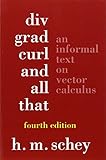https://www.amazon.com/Div-Grad-Curl-All-That/dp/0393925161
which I would highly recommend to physics-minded folks, but would not recommend at all to maths-minded folks.
Good teachers explain things so that students can understand - and explain the rakes.
Bad teachers put up walls of academic nonsense-speak - point at it with a laser - and expect you to know what they are teaching already.
Not all Academic Speech is "nonsense speak". For example - many students really learn the material from supplementary material (good academic speak) vs textbook (nonsense speak).
https://www.amazon.com/Signals-Systems-Made-Ridiculously-Sim...
https://www.amazon.com/Div-Grad-Curl-All-That/dp/0393925161/
These examples show that you explain things well or poorly - explaining things poorly has a direct effect on humanity in the long run.
Later, when I realized what I was missing out on, I tried to teach myself the missing concepts. I failed, until I found H.M. Schey's "Div, Grad, Curl, and All That: An Informal Text on Vector Calculus." It's a pragmatic, friendly, slim little math book that reads more like lecture notes than a classic textbook, and I can fairly say it's taught me everything I know about those operators (which isn't much).
So if you are like me, and got to calc III, vector math, and/or liner algebra without learning div, grad, curl and partial differential equations... check out the book. it's great: https://www.amazon.com/Div-Grad-Curl-All-That/dp/0393925161
Also: can we get three cheers for HYPERPHYSICS?? http://hyperphysics.phy-astr.gsu.edu/hbase/hph.html
I see another book with good recommendations, A Student's Guide to Maxwell's Equations (http://www.amazon.com/Students-Guide-Maxwells-Equations/dp/0...) but I have not read that one.
Div, Grad, Curl helped a bit, but what really made it click for me was an excellent professor some other EE math-class-in-disguise that explained those vector calc operations in terms of divergence (source density) and flux (change in time/space).
As far as understanding the linked paper, I can't follow the proof either. Equations 1-4 I've never seen, 5-8 are Maxwell's Equations which are familiar but we wrote them with different notation, 9-18 are again equations I've never seen. The meat of the proof in 19-21 is built on 14 mystery equations and 4 that I recognize.
As a former EE I guess we didn't prove equations as much as take their existence as given and then figured out what that implied for the real world. ;) Other posters aroberge and wraithm have mentioned also needing QM from physics to follow the proof, which must be where the other equations are from!


https://www.amazon.com/Div-Grad-Curl-All-That/dp/0393925161